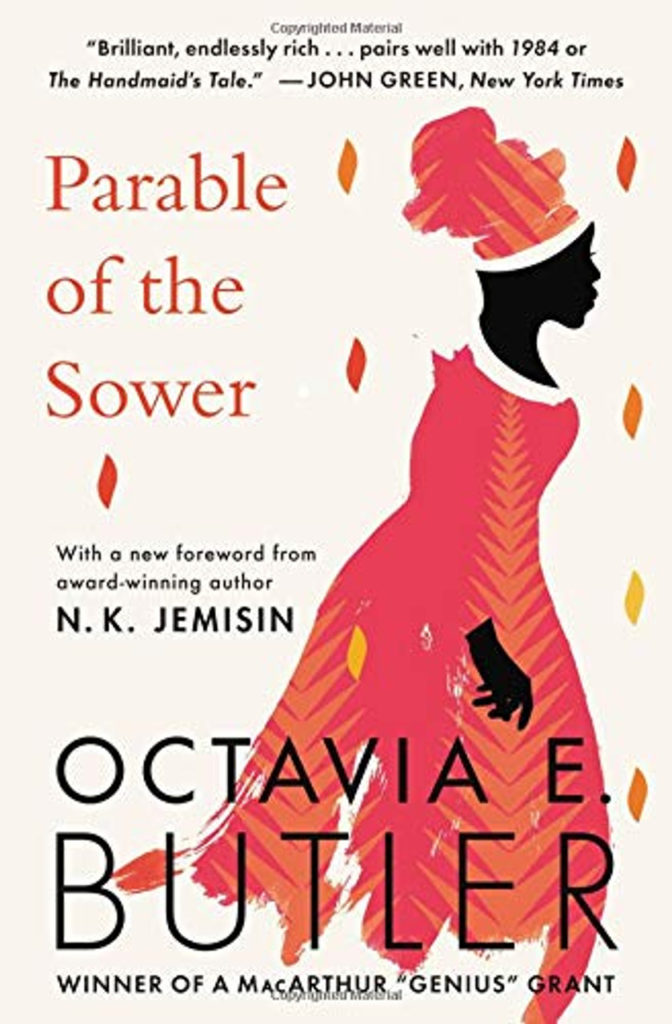A Sensible Future
Octavia E. Butler won many awards during her life. Her novelette, “Bloodchild,” won the Hugo Award, the Locus Award, and the Nebula Award; Butler also won the MacArthur Foundation’s Genius Grant in 1995, the first science fiction author to receive this privilege. However, she received other honours that are quite rare for writers. NASA named the landing site of the Perseverance rover in Jezero Crater on Mars the “Octavia E. Butler Landing.” The International Astronomical Union named a mountain on Pluto’s moon, Charon, Butler Mons. (Another mountain on Charon, by the way, was named for Arthur C. Clarke: the Clarke Montes. The 4923 Clarke asteroid was named after him as well.) Butler’s third space honour, Asteroid 7052 was named Octaviabutler. In other words, she was a well-loved science fiction writer and for good reason.
Octavia E. Butler was an African American woman born in Los Angeles. As a child she was extremely shy. She found refuge in a library for years, reading fantasy and science fiction. Writing science fiction stories was her outlet as a teenager. Her later adult novels are all noteworthy. Parable of the Sower (1993) is one of her best, and although it was written thirty years ago, its themes will resonate with you today.
In this post-apocalyptic novel, Lauren Oya Olamina lives with her family in a walled community near Los Angeles. Like Butler, Lauren likes to explore ideas through writing and journals. These focus on her ideas about religion and human nature. Her father is a Baptist minister, as well as a college professor, but Lauren’s thoughts are very different to his. In her writing, she claims, “God is change” and develops a spiritual and cultural ethos around this principle. In it, existence is about change, and she proposes sensible steps that reflect this reality, and methods to create a better future. She classifies her books on this “Earthseed: The Books of the Living.” Her vision is more rational than religious because she tries to present tangible solutions to resolve the problems of this age: “there has to be more that we can do, a better destiny that we can shape.” Her eventual goal is to spread Earthseed among other stars, on other planets.
Lauren is what they call a sharer. She can feel the pain that others near her feel. If they break a leg, she feels their agony. If they die, she feels the end of their existence, and falls unconscious for a time. Not many people have this ability, though a rising number of North American slavers like it because it pressures servants into cooperating. Lauren is a sharer because her mother took the drug Paracetco while she was pregnant. Paracetco was developed to help people with Alzheimer’s. However, it also “boosted the performance of ordinary, healthy young people. They read faster, retained more, made more rapid, accurate connections, calculations, and conclusions” (Parable of the Talents, p. 13).
Lauren’s abilities are important. They help her survive in a Los Angeles that is a small part of a larger, crumbling civilization. [Butler is known for her “creation of alternative communities” (Wikipedia) and depicting “the survivor as hero” (Wikipedia)]. Gated communities like Lauren’s are falling under the attacks of desperate people: the homeless, people without jobs, people addicted to a drug that drives them to set fires so they can experience arson’s ecstasy. Police are no longer helpful, even if victims pay them to pursue and prosecute criminals. Fire departments no longer respond; they’re overwhelmed by the number of fires the criminals set and water is expensive. Sometimes starving people who have no jobs or money will start fires so that they can rob other homes while the residents are fighting the new fire in their community. Water is scarce. Rain used to fall each year; because of climate change the storms are now irregular, coming sometimes once in five years. Water costs as much as gasoline, and most people ride bikes because they cannot afford cars.
The lack of safe transportation means that young people cannot go to school. Lauren’s father teaches, but he does so once a week online on one of the few computers available at the college. Children in their community cannot learn to read and write since going to school outside the walls isn’t safe. Lauren and her stepmother teach them on the back porch each day.
When Lauren’s community in Robledo eventually falls, she leads two of its survivors north, towards Canada or Alaska. Along the way she acquires more orphans and refugees. They want to find an area where they can settle and rebuild their lives, where water will be cheap and safety can grow. The novel’s plot is based on this journey. Lauren hopes that the sensible principles of Earthseed will help them thrive wherever they set up their homes.
Butler went on to write another award-winning novel, Parable of the Talents (1998), what she called “a novel of solutions.” Although both novels sound dour, their humanism is captivating, their events realistic, and hopeful. Unfortunately, Butler only wrote eleven novels before she died. In 2006, at 58, she suffered a combined stroke and fall and passed away.
According to Washington Post Book World, Butler “casts an unflinching eye on racism, sexism, poverty and ignorance and lets the reader see the terror and beauty of human nature.”
Above all, though, Octavia Butler’s Parable of the Sower is a very good story.
